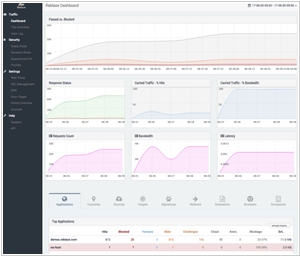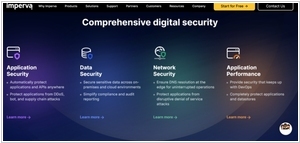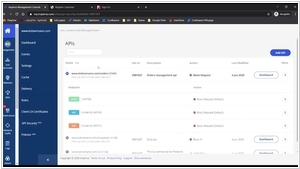Imperva vs Reblaze
June 13, 2023 | Author: Michael Stromann
2

Complete-cloud native web security platform provides full WAAP (Web Application and API Protection) in an all-in-one solution. Protects sites, services, applications, and APIs. Includes next-gen WAF (Web Application Firewall), DDoS Protection, Bot Management, API Security, ATO (Account Takeover) prevention, and much more.
Imperva and Reblaze are both cybersecurity companies that specialize in web application security and offer various solutions to protect websites and applications from cyber threats. However, there are some key differences between them in terms of their approach, services, and target market.
Imperva is a well-established cybersecurity company that provides a wide range of security solutions, including web application firewall (WAF), DDoS protection, bot mitigation, data protection, and application delivery. Imperva's offerings are designed to protect against a wide range of web-based attacks and provide granular security controls to safeguard sensitive data. They serve a diverse range of industries and cater to both small businesses and large enterprises.
Reblaze, on the other hand, is a newer player in the market that focuses on cloud-based web security solutions. Their services include WAF, DDoS protection, bot management, and CDN capabilities. Reblaze aims to simplify web security for organizations by providing an all-in-one platform with user-friendly interfaces and automated security features. They target small and medium-sized businesses (SMBs) as well as larger enterprises.
In terms of approach, Imperva emphasizes robust security features and advanced threat intelligence to protect against sophisticated attacks. They provide customizable security policies and offer extensive reporting and analytics capabilities. Reblaze, on the other hand, focuses on ease of use and simplicity. Their platform offers a user-friendly interface, automated security measures, and streamlined management.
Both Imperva and Reblaze have their strengths and cater to different segments of the market. Imperva is suitable for organizations with complex security requirements and the need for advanced features and customization. Reblaze, on the other hand, is well-suited for organizations that value simplicity, ease of use, and an all-in-one security platform.
See also: Top 10 Website Security platforms
Imperva is a well-established cybersecurity company that provides a wide range of security solutions, including web application firewall (WAF), DDoS protection, bot mitigation, data protection, and application delivery. Imperva's offerings are designed to protect against a wide range of web-based attacks and provide granular security controls to safeguard sensitive data. They serve a diverse range of industries and cater to both small businesses and large enterprises.
Reblaze, on the other hand, is a newer player in the market that focuses on cloud-based web security solutions. Their services include WAF, DDoS protection, bot management, and CDN capabilities. Reblaze aims to simplify web security for organizations by providing an all-in-one platform with user-friendly interfaces and automated security features. They target small and medium-sized businesses (SMBs) as well as larger enterprises.
In terms of approach, Imperva emphasizes robust security features and advanced threat intelligence to protect against sophisticated attacks. They provide customizable security policies and offer extensive reporting and analytics capabilities. Reblaze, on the other hand, focuses on ease of use and simplicity. Their platform offers a user-friendly interface, automated security measures, and streamlined management.
Both Imperva and Reblaze have their strengths and cater to different segments of the market. Imperva is suitable for organizations with complex security requirements and the need for advanced features and customization. Reblaze, on the other hand, is well-suited for organizations that value simplicity, ease of use, and an all-in-one security platform.
See also: Top 10 Website Security platforms
Imperva vs Reblaze in our news:
2023. Website security platform Imperva is acquired by French giant Thales

Thales, the French defense group, is acquiring the cybersecurity company Imperva for $3.6 billion. Imperva is known for its expertise in data and application security, offering a wide range of services, including web application firewalls (WAFs), API security, DDoS protection, account takeover (ATO) protection, and data activity monitoring (DAM), among others. Thales has been actively investing in strengthening its cybersecurity portfolio through various acquisitions in recent years. For instance, in 2017, it made a significant $5.5 billion deal to acquire Gemalto, a company specialized in digital identification and data protection, particularly in the banking sector. More recently, Thales completed the acquisition of Excellium and S21SEC in deals that concluded last year. Additionally, Thales is in the process of acquiring the Australian cybersecurity startup Tesserent for $176 million (AUD). With the addition of Imperva, Thales is making its entry into the application security market while further expanding its presence in the data security domain.



